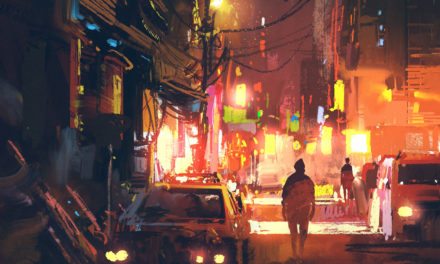70 Decibels
by Nicole D. Sconiers
Issue 12: Sound | 4,179 words

Untitled, © okalinichenko/Adobe Stock
Lark hurried through the streets of Germantown on her way to Joy’s bar, careful to step around the people vomiting on the sidewalk. Her mouth watered. She felt dizzy, akin to motion sickness. Her state, though, was nothing like that of the older woman at the bus stop. The woman, dry heaving into a yellow grocery bag, looked up momentarily as Lark passed. Bits of puke clung to the woman’s locs. Lark smiled sympathetically. You get used to it, she wanted to say.
But did you ever?
The ashen façade of Booker Plaza seemed to shimmer in the distance. It was a sixteen-story housing project that towered over the community like a fallen king. She wasn’t far now. A short kid in a do-rag nodded as she approached. She nodded in return. He was smoking in front of Suprimo Coffee Roastery, a shop that advertised black honey beans imported from Brazil. The place was once a crowded barbershop called Fades. When Lark was a teen, she and Joy used to slow their pace as they walked past the shop’s plate-glass window. Public Enemy and KRS-One would throb from the speakers, drowning out the din of clippers as cute boys sat in chairs getting high-top fades and trendy lines etched into their scalp. The kid with the do-rag stood where the red, white, and blue barber’s pole used to hang, looking like a ghostly regular from Fades who had lost his way. He took a drag of his cigarette and exhaled, trying to mask his queasiness in a cloud of smoke. His watery eyes gave him away. It was as if everyone on the block had stumbled out of a sadistic amusement park, shaken and battered by some soul-snatching ride.
The nausea subsided as Lark approached Chelten Avenue. Her old hangout. She hadn’t grown up in Germantown, but she always claimed the once-bustling neighborhood in northwest Philadelphia as her home. The sounds of retching were behind her, although the sour smell likely hugged her sweater. A clicking sound made her turn. A white guy with a neon green helmet sped past her on his bike. Spokes snapped as he swerved to avoid a soupy puddle. Up ahead, a blonde woman walked a Bichon Frise. The dog was fitted with a pink jacket that put Lark’s well-worn sweater to shame. Neither human acknowledged Lark or gave the familiar nod of greeting common to these parts.
Lark glanced at her watch. It was a little after six. She looked down at her wrist again, this time at the red band next to her watch—the decibel app. In an ominous digital display, the app measured out the sounds of her daily life. Walking: about 23.5 decibels. Her breath: 10 decibels. Talking on her cellphone: 60 decibels. The app emitted a nervous buzz when she neared 70 decibels. At 70, she was a walking violation.
The streets were much quieter now, ordered by the city to be paved over with permeable asphalt. The pavement felt too smooth and soulless beneath her feet. Lark missed the cobblestones. Those gray, blue, and orange river rocks lining the road once gave Germantown its rustic charm, a separate identity from the rest of the city. But those bumpy 200-year-old stones made everything louder, made the most mundane noises—clacking heels, baby strollers—vibrate in defiance. In England, which exported the rocks to the U.S. during the mid-1800s, villagers used to scatter straw over cobblestones outside the house of a dying person to dampen the sound. Lark could understand that. It was a solution to something considered a temporary annoyance. Here in Philly, the city’s solution to ambient noise was much darker. And permanent.
Lark was a few blocks from Verdant, Joy’s bar. “Bar” was a misnomer, as Joy only served non-alcoholic green drinks and smoothies, and no music ever roared from within. But Verdant was a nice after-work spot to chill and catch up with her favorite cousin. All they did now was reminisce about the past—the boys they kissed, the house parties they snuck out to, the dances they learned on the courtyard of the Booker. When you were their age, it seemed as if there were more good memories behind you than in front.
She turned onto Alexander, a street once filled with squat rowhouses where her cousin grew up. Lark walked down the block that had been the source of so much adventure in her teen years. She, the townie cousin who wanted escape from the bland hamlet, and Joy, the savvy city girl, started hanging out the summer they both turned fifteen. The Booker blasted its way not only into their weekend exploits but into their consciousness. They could hear it from Joy’s narrow bedroom on Friday nights as they crimped their hair and drew on extra-thick black eyeliner for a stroll through the hood like giddy tourists. The Booker called to them. As they stood on the corner and looked up at the high-rise, it pulsed with music and light.
That was the late 80s. In the past few years, the rowhouses had been replaced with colorless walkups and condos. The Booker stood vacant, slated for demolition. Just another part of her youth to be erased. It was a warm autumn night, but there were no air conditioners droning from tight windows. No kids sat on stoops or jumped Double Dutch in the street, twin ropes thwacking the pavement in rhythmic insolence. The sky was streaked with rose and umber, draping the projects in muted elegance. Lark crossed the street, approaching a courtyard that bordered Booker Plaza.
The high-rise was named after an influential Black person to give the place a veneer of respectability. Absalom Booker, a former slave from Maryland, had bought his freedom and dreamed of becoming a minister. He joined a caravan of freedmen and women heading north to Philadelphia, where he was ordained as a minister in the 1780s. The benevolent white elders allowed him to lead the service at a Methodist church in Germantown. Booker’s popular preaching style attracted crowds of Black visitors, but disturbed the white members, who restricted his sermons to the early morning hours. Not only was the former slave’s message too radical, he was too loud. Disillusioned with segregated prayer services and white oversight, Booker and his followers left the church and began to worship in the woods around Germantown. Their unorthodox ceremonies were often accompanied by drums and tambourines and wild dancing among the trees.
Naturally, the government thought a towering housing development cramped with people in the inner city was the perfect way to honor Absalom’s memory. Whether Black folks were assigned to live in the Booker or just needed a cheap place to stay to get on their feet, they did the best they could. They took an ash-colored building with stingy sash windows and infused it with life and sound. The Booker was built in 1983, years before noise became a public health crisis, before federal reinforcement of quiet communities. Before sound was twisted into something monstrous.
When Lark was a teen, the courtyard would be packed around this time of night, regardless of season. She and Joy would watch the boys play basketball, dunking balls in a hoop with no net. Residents of Booker Plaza were always smoking on their balconies. Some fresh older boys would call down to the girls walking through the courtyard, trying to get them to come up. Lark and Joy ignored those asphalt mating calls, choosing instead to walk to the Chinese restaurant on the corner to order greasy eggrolls and shrimp fried rice. There they would meet up with Joy’s boyfriend, Scooter, and his friend, Bryce. Scooter was a pimply deejay, who often lugged a crate of vinyl records to basement parties and cookouts. Bryce was a handsome brown-skinned teen who worked at Fades part time and kept a fresh cut.
As a young couple, Joy and Scooter often disappeared for afternoons, leaving Lark and Bryce alone to kill time. In their long chats, they discovered a mutual love of Fangoria magazine. They often traded copies, animatedly discussing the goriest kills. Although Bryce thought Lark lived in some fancy neighborhood (she didn’t), he understood why she wanted to hang in his part of town. The Booker was just another haunted house like the ones they read about in Fangoria. Unlike those soundless dwellings, the high-rise roared.
Lark ventured inside the Booker just once. With its dark halls and even darker landings, it was a shadowy lovers’ lane encased in concrete. She had her first kiss with Bryce there, pressed up against a fire extinguisher cabinet. Music seemed to flow beneath every door. Luther. Cheryl Lynn. KRS-One. Doug E. Fresh. A generational get down. Everyone was throbbing to the same beat behind locked doors. The residents always seemed to be playing cards, throwing house parties, stringing multicolored Christmas lights on their balconies in the middle of July. Their revelry was contagious. Down on the street, boys would crank up their boom boxes to compete with the glowing, towering house party, which always led to impromptu dances on the basketball court, decades before flash mobs were a thing. It was as if everyone inside the Booker and in its shadow was gyrating in concert to Absalom’s bygone tambourines and drums in the nearby woods.
Everyone was just being Black and minding their own business and having a good time. The closest Lark came to that feeling of communal pride in her small town was during the Friday night football games where people on the bleachers went wild at every touchdown. But those were appointed times for celebration and high decibels of joy. The sonic gatherings around the Booker felt like spontaneous eruptions of community. It felt like home.
It’s weird how sound imprisons some but frees others, Lark thought. The new neighbors were unfriendly and closemouthed, with hands perennially curled around leashes, bicycle handles, or steaming cups of coffee. Even their footsteps were soundless. Before the government revived the Quiet Communities Act, they always called the cops on the kids in the courtyard. Police cruisers were a common sight on the block, breaking up gatherings and writing fines for noise pollution and other nonviolent crimes that impacted the quality of life for the new inhabitants.
When noise annoyance became a public health crisis in 2023, with real or imagined ailments ranging from stress and high blood pressure to mania, cities, in concert with developers, took drastic steps to reduce ambient sound. Aural architecture promised to reshape the soundscape of metropolitan areas. Buildings were constructed with noise neutralizing systems to muffle the clamor of urban living. Cities required existing structures to be retrofit to code. Lark knew of many residents who lost their rowhouses and returned to pricier housing units they could not afford. The housed and unhoused lurched around Philly like zombies, not in search of fresh blood and organs, but on the hunt for stability.
Government officials and the architects of these sound-safe cities either didn’t know or didn’t care that extreme noise cancellation in tight urban areas disrupts equilibrium. Some people experienced nausea or fatigue. In others, the alien silence produced a feeling of motion sickness, the same dizzying sensation that engulfed Lark when she read a book while riding the train. Absence of sound fucked with your inner ears. Your body felt like it was moving, but you were really standing still.
Seventy decibels. That was the upper limit of urban ambient noise mandated by the government—the same decibel level as a vacuum cleaner or a washing machine. To enforce this restrictive frequency, the city hired a private police force. The amp patrol. The private police rode around in black vans with noise meters mounted on top. Instead of tasers, they used sound neutralizers for crowd control. Lark had never been zapped by one, but she heard the sensation was like a reverse stun gun. Instead of a brutal current ripping through your body, electrical charges flowed out of you, draining you of your life force.
As Lark walked down the silent block, she could see Joy through the front window of Verdant. Her cousin had bought the old Chinese restaurant and converted it into a neighborhood lounge where the locals could feel safe while sipping healthy elixirs. Even though Joy sold no liquor, the place was always crowded. People came there often for tonics and potions to help with nausea. Lark opened the door and was greeted by a rush of stillness. Several women sat at the bar, downing smoothies. A young couple huddled at a table next to the window, holding hands. Everyone wore headphones. Joy looked up from the counter where she was pouring some green brew into a glass. She still sported the same hairstyle from when she was fifteen, short spiky locks that gave her an elfin look.
“What’s up, cuz?”
“Same old. I need a pick-me-up. Something that’s not puke colored.”
Joy smirked at her. “Who knew an art gallery could be that stressful?”
“A museum,” Lark corrected. “Don’t hate. Archiving is a lot of work.”
Their voices were barely above a murmur, a tone reserved for libraries and funeral parlors. Joy opened a mini fridge behind the bar and took out a bottle. The beverage was a dusty red color. Like pomegranate. Whirring blenders were around 88 decibels, and Joy didn’t have the money to get the old Chinese restaurant retrofitted with a noise cancellation system. Her lounge hadn’t escaped the clutches of petty bureaucracy. She got hit with several noise complaints, which came with hefty fines. In concession, she now purchased premade drinks but added her own special touch. She placed one such concoction in front of Lark.
“This one has extra ginger and peppermint.”
“I’m not dizzy anymore,” Lark said.
“For the walk back.”
Joy poured herself a drink and sat across from her cousin. Their knees touched. “I’m thinking about having a party when they tear down the Booker,” she said.
“They’ve been promising to do that for a while now, cuzzo. Building’s been vacant for the past four or five years.”
“We just got notice it’s on the city’s demolition list, scheduled for the end of the month.”
Lark shifted in her seat. Even though she hadn’t grown up in the area, Germantown was still her community. But she knew the recent neighbors and some long-time residents complained about what they saw as blight. She twirled a lock of twisted hair around her finger, trying to imagine standing on that narrow street where her cousin used to live and gazing up at a hole in the sky. Once the Booker was razed, the city would erect more bleak condos, flats, and walk-ups—all in the name of noise regulation. Could you reshape the sonic landscape of a community too much, warping it into something sinister?
“I’m pretty sure old Absalom wouldn’t take too kindly to his namesake building being knocked down in the name of silence,” Lark said.
“Things can’t stay the same forever.” Joy thumbed the red wristband of her decibel app. “I’m gonna do something to commemorate the old building. Maybe I’ll make demolition-themed smoothies—Raze the Roof Raspberry or Wrecking Ball Watermelon.”
Lark sighed. Her cousin seemed eager to celebrate the building’s destruction. “Too bad Scooter can’t deejay,” she said. “You could have a real party.”
“I ain’t tryna get slapped with another fine by the decibullies. Or worse.”
They sipped their drinks in silence. Lark could make out the strains of smooth jazz from the headphones of the woman next to her at the bar.
“Maybe I’ll invite Bryce,” Joy said with a slick grin. “You know he’s divorced now.”
“How would I know that?”
But Lark did know. She had been keeping tabs on her former flame on social media. It was silly to still have a schoolgirl crush at her big age. Memories came flooding back of her make-out sessions with Bryce in the belly of the Booker. Maybe she could wrangle a kiss in the dusty whirlwind of the building’s implosion.
••••
The demolition of the Booker took place on a warm Saturday in September. Bryce flaked. He gave Joy some excuse about not wanting to see the demise of his old stomping ground. Instead, Scooter joined them for the affair. He still lived up the block from the projects and was on house arrest after getting busted for spinning records at an underground party.
A crowd of about twenty people gathered on Alexander Street, which faced the high-rise. Lark and Scooter sat on the steps of the walk-up that had replaced Joy’s old rowhouse. Joy passed out plastic grocery bags and ginger gummies to the bystanders. Little old ladies wore earmuffs to drown out what they assumed would be an avalanche of sound. Some younger dads hoisted their kids up on their shoulders to get a better view, as if spectators at a parade. When she finished passing out barf bags, Joy joined Scooter and Lark on the steps. It was like a block party without the music and merriment.
The amp patrol, planted on the perimeter of the Booker, monitored the situation. Their black vans were lined up in a row like coroners in search of bodies. The decibullies never passed up an opportunity to hand out fines or zap folks with sound neutralizers and haul them off to jail.
Suddenly, there was a hushed explosion, like firecrackers heard from inside a house. A wavy “Ahh” went up from the crowd. Lark squeezed Joy’s hand. Her mouth started to water. She had that sick sensation of her body moving while her head remained inert. The right side of the high-rise seemed to collapse in slow motion, pulling the rest of the building down with it in plumes of smoke. Clouds of brown dust and debris filled the air, obscuring their view of the void in the sky where the Booker had once jutted out like ragged royalty. A few people cheered. One older woman with silvery braids wiped away tears. Joy and Lark embraced. It was like witnessing the execution of a sick elderly relative. You knew they were ready to go but just not so quickly and violently. After those brief cheers, there was an eerie stillness.
It was over. Scooter tagged along as Lark and Joy walked to the bar. The imprint of his ankle monitor was visible through his sweats. They took the long way down several side streets to avoid any lingering dust in the air. No one spoke. Once they reached the bar, Scooter and Lark took seats in the unlit lounge. Joy poured pre-mixed drinks from the fridge then joined them at the table facing the window. The threesome gazed out at the courtyard and the newly empty place above it.
I have no right to feel so nostalgic, Lark thought. Buildings were always getting razed. Neighborhoods were always being restructured. The texture of a community rippled at times. It was the way of the new world.
Sound shaped.
Lark sipped her drink. Joy had added extra ginger, and the spiciness lingered on her tongue. Across the table,Scooter reached for Joy’s hand. Focused on her own drink, Joy brushed him away.
A tapping noise at the window startled them. Bryce stood there with a faint smile on his lips. Joy waved him in. As the door opened, Lark quickly placed her drink on the table, lest her shaking hand betray her.
“‘Sup, y’all.”
“‘Sup, Bryce.” Joy rose, giving him a hug. “I didn’t think you were coming.”
“I couldn’t resist a drink between old friends,” Bryce said. He wiped his eyes with the back of his hand.
Bryce was a little heavier, with the weathered skin of a man who works outdoors, but still fine as ever. He dapped up Scooter, then pulled out a chair next to Lark, who toyed with her hair.
Bryce turned to look at her. She was heavier now too, but she hoped he could still see the same nerdy girl.
“Still reading Fangoria?” he asked.
Lark laughed. “Not in years.” She gestured toward the black vans on the street. “I don’t need to now.”
Joy poured four shots of wheatgrass and brought them back to the table. The men grimaced at the green drinks but took them anyway.
“To old Booker,” Joy said, holding her shot glass up high. “May he always float amongst the trees.”
While they toasted, a woman with red hair passed by the window, walking a German shepherd. When she reached the corner, about to cross the street, she suddenly began to gyrate.
Inside the bar, the foursome glanced quizzically at each other then back at the lady who moved rhythmically, as if to a beat. The street remained muted.
“I figured some folks would be happy to see the Booker go, but not this happy,” Joy joked. But her laughter sounded uneasy.
The German shepherd barked excitedly at its owner. The leash fell from her hand, and the dog took off down the block. The woman twirled on the sidewalk, as if in a trance.
“The hell’s wrong with ol’ girl?” Scooter said. “Must be that new meth.”
More people gathered in the dusty shadow of the Booker. New residents and old. Lark and her friends watched, first puzzled, then alarmed by the manic movements. Some people shouted as they flailed their arms, as if touched by the spirit. Others leaped frantically in the air, tears streaming down their face. A blond kid rode by, crashing his bike into the fence enclosing the courtyard. He twitched on the ground, as if about to perform some bizarre breakdance.
“Should we call 9-1-1?” Lark tried to keep her voice steady.
“Po-po’s already out there,” Scooter said grimly. He nodded at the amp patrol in their black uniforms, trying to contain the growing crowd. Several officers got caught up in the delirium. They waved their neutralizing guns in the air like frenzied conductors at an orchestra of the damned.
Joy locked the door.
By late afternoon, people were still dancing, if that’s what you called the spontaneous eruption of erratic movement. A plague of palsy. Safe inside the lounge, Lark pressed her face to the glass, an observer outside a mosh pit. She felt as if she were witnessing some creepy ritual from medieval times, a contemporary St. John’s dance. Some people dropped from exhaustion, bloodied and panting. Others screamed as they swayed, faces contorted in joy and rage. Maniacal noises filled the lounge. Lark’s decibel app went off with a sharp buzz, startling her. It vibrated a warning against her wrist. A few seconds later, Joy’s did too. Lark glanced at the display. The digitized numbers rose to levels she only saw in airports—105 decibels. 110.
Her hand began to shake. She was afraid to leave the lounge, a place where she once hung out with her friends, munching egg rolls. She and Joy had partied on these very streets as teens, streets they thought they owned. Now she was terrified of being swept out of the bar and down the block on a perverted current of sound.
Joy went into the back room and returned with a flask. She poured four shots. Of real liquor this time. She flipped the power on the lounge’s old stereo. A rousing hip-hop song spilled forth, and Joy cranked up the volume. As loud as the music was, it calmed Lark. She bobbed her head a little to the rhythm. Scooter did an old man two-step, perhaps remembering those nights in dank basements when he used to rock the party.
The decibel apps bleated in protest. Lark pulled off the red wristband and tossed it in her purse. Joy removed hers and dropped it in the dishcloth drawer. The four friends huddled by the window sipping brandy as they watched the grotesque mob in the courtyard. Dirty limbs peaked out of the reanimated ash of Booker Plaza.
At the chorus, the song thundered out of the speakers, vibrating the window. Lark touched the glass, felt the tremor through her fingertips. What if the window cracked? Nothing else separated them from the ghostly rhythm roaring through the streets.
“This is my jam,” Scooter said, interrupting her thoughts. He tried to muster up his usual bravado but his movements were nervous. Joy, glancing back at Scooter, smiled and turned to join him.
Bryce took Lark’s hand and pulled her to him. Her face felt hot. She was suddenly so close to the man she had been dreaming about for years. The music was too upbeat for a slow dance, but they swayed across the floor, reluctant lovers at a dark prom. Their bodies twirled amidst the thrum of tumult and hip-hop. Dust eddied outside the glass, the reckless embers of a building named after an unshackled preacher.
Lark closed her eyes. In the darkness, she heard the sound of tinkling glass. Bryce leaned in for a kiss.

Nicole D. Sconiers
Nicole D. Sconiers experiments with speculative fiction, sci-fi, and horror, centering on stories of complex black heroines. Her flash fiction story “How to Become an Ancestor” appeared in Lightspeed magazine. Her short story “Kim” was published in Sycorax’s Daughters, a Black woman’s horror anthology that was a Bram Stoker Award finalist. Ms. Sconiers was a guest columnist for Nightmare magazine’s The H-Word. Her short story “The Eye of Heaven” appeared in the anthology Black from the Future: A Collection of Black Speculative Writing, published by BLF Press. Ms. Sconiers currently resides in Pennsylvania, where she is working on a collection of horror stories.




